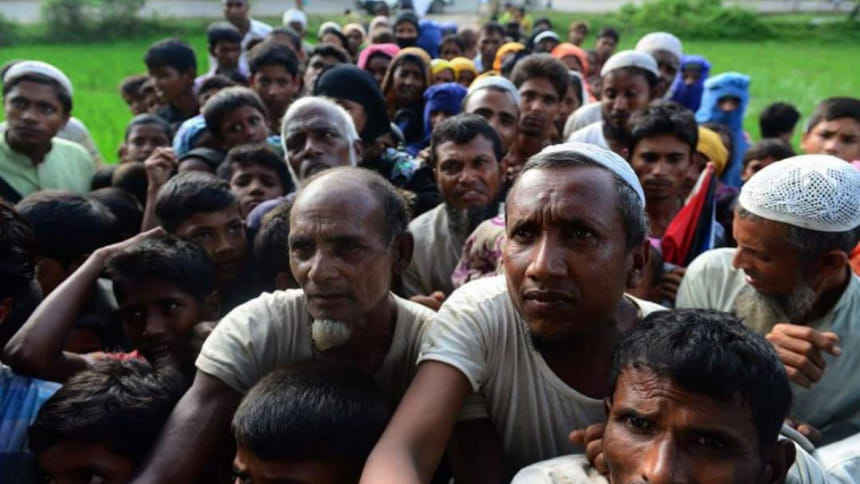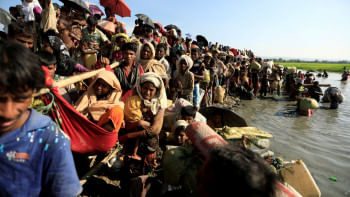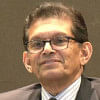Rohingya repatriation talks go nowhere as crisis marks 1st anniversary

The Rohingya crisis steps into the first anniversary on Saturday with no real progress in the repatriation drive by Bangladesh other than the continuation of dialogue with Myanmar though Rohingyas are still coming into Bangladesh due to the absence of conducive environment in Rakhine.
"So far, the only progress is that the talks with Myanmar on repatriation have not stopped. And unfortunately, Rohingyas are still coming into Bangladesh for lack of conducive environment in Rakhine State," a senior official told UNB reviewing the situation.
Myanmar State Counsellor Aung San Suu Kyi in her recent remarks in Singapore tried to convey a message it is only Bangladesh which can decide how quickly Rohingyas would return to Myanmar apparently blaming Dhaka for the delay.
"It's not true that Bangladesh is delaying the repatriation process," the official said adding that Rohingyas are still coming in small groups every week.
August 25 marks the first anniversary of the launching of crackdown by Myanmar's military on Rohingyas in Rakhine State in response to what Myanmar says attacks by the Arakan Rohingya Salvation Army on police posts.
Security forces and their proxies killed thousands of Rohingya, burned villages to the ground, committed widespread sexual violence and drove more than 700,000 people to flee into Bangladesh.
A government official stationed on the ground said Bangladesh border still remains open which is unprecedented and shows Bangladesh's generosity on humanitarian grounds.
Suu Kyi, in a lecture in Singapore on Tuesday, said it was difficult to say when the Rohingyas who fled will be able to return to Rakhine state because her nation needs the cooperation of Bangladesh, according to an AP report.
She said Myanmar has mapped out general sites for the resettlement of returning Rohingya, but the timing of the repatriation also depends on Bangladesh.
The Myanmar leader defended her government's actions in Rakhine state, where about 700,000 Rohingya Muslims fled from a brutal counterinsurgency campaign to Bangladesh.
She said terrorism, not social discrimination or inequality, triggered the crisis.
On August 11, a Bangladesh delegation, led by Foreign Minister AH Mahmood Ali, saw the 'trail of wide-spread devastation' suffered by the people of Rakhine State, especially the burning of Rohingya houses, but Myanmar tried to narrate those as 'accidental fires' by Rohingyas themselves.
Asked about the progress of Rohingya repatriation, Foreign Secretary M Shahidul Haque said they are very hopeful that Rohingyas will return to their homes in Rakhine through a process.
He, however, said the repatriation process is getting delayed a bit while Rohingyas want safety, security and their citizenship rights before they return to Myanmar. "There's no doubt they'll go back to Myanmar."
"The entire process is a challenge. No challenge is beyond solution. We can overcome any challenge if there is a strong will between the two countries or parties. That's important," said the Foreign Secretary.
He said the international pressure on Myanmar sustained over the past one year as Bangladesh worked both bilaterally and multilaterally to find a peaceful solution to the crisis. "We've seen broader embargo...I don't see any possibility that pressure will come down."
Bangladesh has emphasised the need for accelerating efforts to create a congenial environment there and build houses and villages for the returnees to facilitate the repatriation.
Foreign Secretary Haque reiterated that the repatriation issue in any country is a very 'complex and difficult' issue which cannot be done overnight.
"They (Myanmar) have shown what preparations they've taken so for taking Rohingyas back from Bangladesh. I would say something is done," he said.
Talking to UNB, Refugee Relief and Repatriation Commissioner (RRRC) Mohammed Abul Kalam said they are waiting to see more steps as pledged by Myanmar.
The number of Rohingya arrivals from Myanmar to Bangladesh since August 25 last year now stands over 700,000.
Myanmar authorities have taken little efforts to make any tangible progress to improve conditions in Rakhine State for the safe return of Rohingyas in almost one year into the crisis began though the international community, including the UN, remains actively seized with the issue, officials said.
The UN Security Council will hold an 'open briefing' on the situation in Myanmar under the UK Presidency on August 28, a senior official at the Ministry of Foreign Affairs told UNB.
He said UN Secretary General Antonio Guterres and the UN High Commissioner for Refugees are scheduled to brief the Council.
UNHCR Goodwill Ambassador and actor Cate Blanchett will also brief United Nations Security Council on August 28.
Her goal is to draw attention to the plight and resilience of Rohingyas she met in Bangladesh recently, UK office at the UN and UN Refugee agency tweeted on Thursday.
During her Bangladesh visit, Oscar-winning actor Cate Blanchett urged Myanmar to create decent conditions in Rakhine Sate for the safe return of Rohingyas saying the solution to Rohingya crisis lies in Myanmar.
"Ultimately, I think, the key here is to address their statelessness," she told UNB in an interview after her Bangladesh visit mentioning that much more needs to be done to make sure there are decent conditions for the refugees to return safely when they want to.
The UNHCR envoy, who was named a UNHCR Goodwill Ambassador in May 2016, said the conditions right now in Rakhine state are clearly not conducive to the safe and voluntary return, or the dignified return of the refugees who have fled to Bangladesh.
There will be further high-level meetings and events during the General Debate and high-level segment of the 73rd session of the UN General Assembly in September 2018.
Make Myanmar Face ICC
More than 130 lawmakers from across Southeast Asia on Thursday demanded the international community bring officials in Myanmar to justice for atrocity crimes committed against the Rohingya population of Rakhine State.
In the joint statement, 132 sitting MPs from five countries -- Indonesia, Malaysia, the Philippines, Singapore, Timor-Leste - including 22 members of ASEAN Parliamentarians for Human Rights, called on members of the UN Security Council (UNSC) to refer the situation in Myanmar to the International Criminal Court (ICC).
Since Myanmar is not a signatory to the Rome Statute, the ICC does not have jurisdiction in the country and only the UNSC can trigger an investigation by the Court, according to the statement UNB received from Jakarta.
"One year has passed since the Myanmar military launched its murderous operation in Rakhine State, yet we are no closer to seeing those responsible brought to justice. As Myanmar is clearly both unwilling and unable to investigate itself, we are now at a stage where the international community must step in to ensure accountability," said APHR Chairperson Charles Santiago, a member of the Malaysian Parliament.
"I stand together with 131 of my elected peers in calling on the members of the UNSC to immediately refer the situation in Myanmar to the ICC. Those in Myanmar responsible for these horrific crimes must be held to account; they cannot be left free to commit the same abuses again in the future," said Santiago.
The regional lawmakers recognised the crucial role played by their own governments in pursuing accountability.
They urged members states of the Association of Southeast Asian Nations (ASEAN), including Indonesia, which will take a seat on the UNSC next year, to press the Myanmar government and military to end all forms of human rights violations against the Rohingya and other ethnic minorities.
They also urged the international community to support the calls of Yanghee Lee, the UN Special Rapporteur on the situation of human rights in Myanmar, to establish an international accountability mechanism that aims to impartially investigate human rights violations in the country.
Strong Multilateral Engagement
Bangladesh will maintain a multilateral 'strong engagement' to keep up pressure on Myanmar so that it takes back Rohingyas ensuring their safety and citizenship through bilateral mechanisms, said an informed source.
"Bangladesh's multilateral engagement helped keep Myanmar under pressure resulting in some outcomes bilaterally," the diplomatic source told UNB.
Whatever has been achieved so far, including the signing of an MoU on repatriation of Rohingyas and building some structures in Rakhine State, is the outcome of pressure through a multilateral approach, the source said.
In November last year, Bangladesh and Myanmar signed an 'instrument' on Rohingya repatriation with no ending deadline amid high hopes that the forcibly displaced Rohingyas will start returning to their homeland within the following two months.
However, the repatriation of Rohingyas is yet to begin as Myanmar has 'failed' to create conducive environment in Rakhine State for the safe return of Rohingyas.
"The conditions on the ground are still not conducive to a safe and voluntary repatriation," Spokesman for the UN Secretary-General Stephane Dujarric told reporters on August 17 in a regular briefing.
Diplomatic sources said China, India and Japan have apparently created some pressure on Myanmar for a peaceful solution to the Rohingya crisis.

 For all latest news, follow The Daily Star's Google News channel.
For all latest news, follow The Daily Star's Google News channel. 









Comments